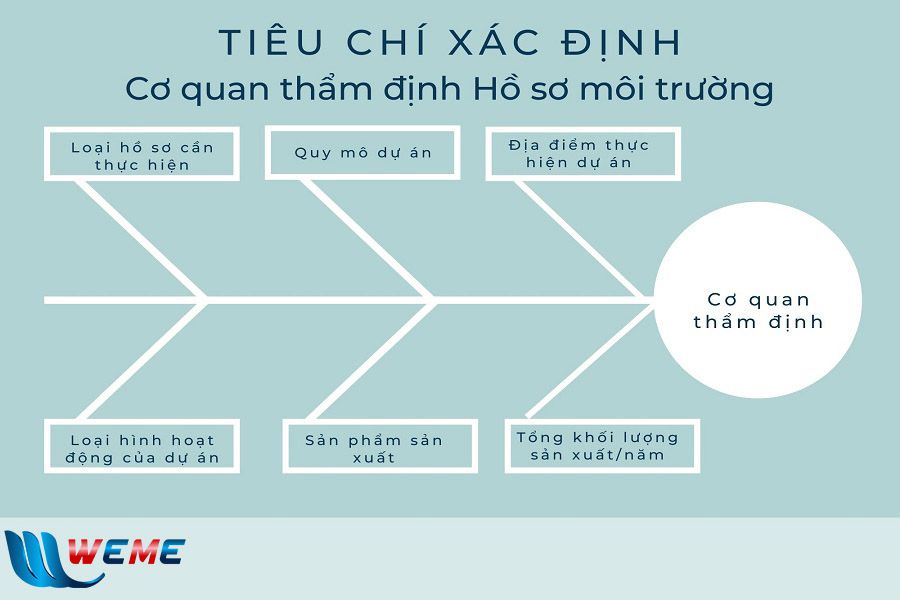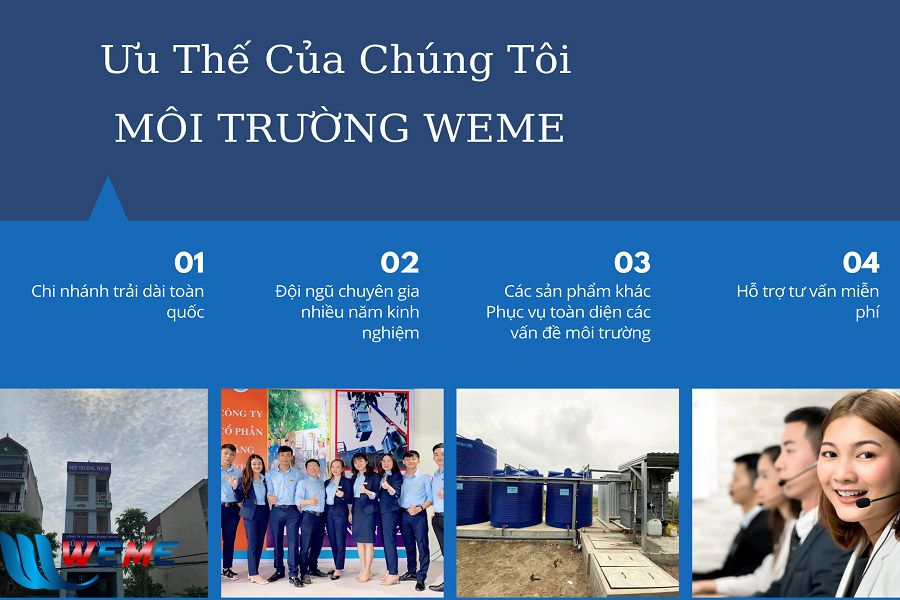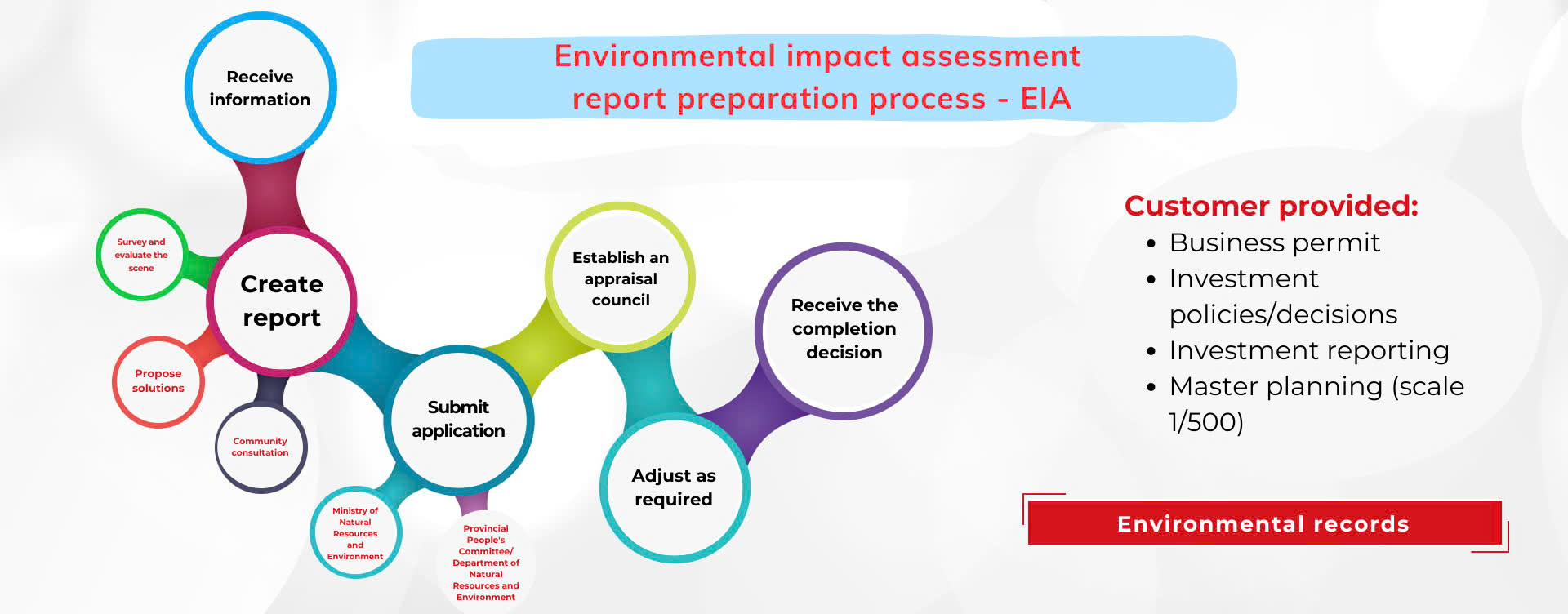ENVIRONMENTAL PROFILE
ENVIRONMENTAL PROFILE
- Overview of Environmental Impact Assessment and Environmental Documents
- Purpose of Environmental Impact Assessment and Other Environmental Documents
- Timeline for Conducting Environmental Impact Assessments and Other Environmental Documents
- Authorities Responsible for Approving Environmental Impact Assessment Reports and Other Environmental Documents
- WeMe – A Leading Environmental Consulting Company
Overview of Environmental Impact Assessment and Environmental Documents
What is Environmental Impact Assessment (EIA)?
Definition
Based on the Environmental Protection Law No. 55/2014/QH13, an Environmental Impact Assessment (EIA) is a type of environmental document that analyzes and forecasts the environmental impacts of specific investment projects. The goal is to propose practical measures to protect the environment during the implementation of the project.
The EIA report serves as a foundation for businesses to clearly understand the environmental quality around the project area, allowing them to propose the most effective measures to minimize environmental pollution and comply with state regulations. Additionally, the results of environmental quality monitoring serve as a basis for state environmental protection agencies to evaluate the company’s environmental protection efforts.
Why is an Environmental Impact Assessment necessary?
This is a mandatory requirement for projects if they are to be implemented, as without an EIA, the project will not be approved or licensed for implementation and operation.
For more details, see: Environmental Documents – Environmental Impact Assessment.
Other Environmental Documents Besides the Environmental Impact Assessment
Environmental documents come in many types. Based on Decree 40/2019/ND-CP and Circular No. 25/2019/TT-BTNMT, these include:
- EIA,
- Environmental protection plan,
- Waste discharge report,
- Periodic environmental monitoring,
- Waste discharge permit,
- Waste discharge permit renewal.
Each type of environmental document has its own procedures for implementation, depending on whether it is before or after the project becomes operational.
Purpose of Environmental Impact Assessment and Other Environmental Documents
- To compile detailed information and assess the environmental pollution caused by the project.
- To propose management measures to predict and promptly address potential causes of environmental pollution and thus reduce the likelihood of environmental degradation.
- To conduct EIA surveys on pollution-causing factors, assess the effectiveness of proposed measures, and monitor environmental quality management in the area.
- To ensure environmental issues related to machinery, treatment techniques, and the project’s financial resources are addressed to make feasible decisions for the project.
- To involve the local community in the project’s implementation process.
Benefits for the Environment and Regulatory Agencies
- Ensuring compliance with state policies on balancing economic-social development with environmental protection.
- Evaluating and predicting the project’s environmental impacts and proposing measures to reduce or mitigate negative impacts, followed by environmental protection plans.
- Facilitating easier monitoring and inspection of business operations.
Benefits for Businesses
- Gaining a comprehensive understanding of the environmental protection tasks and regulations the project must follow, ensuring consistent and reasonable implementation without wasting time or resources.
- Helping businesses proactively implement environmental protection measures before and after the project becomes operational.
- Avoiding penalties from environmental authorities.
Timeline for Conducting Environmental Impact Assessments and Other Environmental Documents
Environmental documents are executed at two key stages:
- Before the project becomes operational (for new construction investment projects, or those expanding in scale or capacity),
- During the project’s operation.
Authorities Responsible for Approving Environmental Impact Assessment Reports and Other Environmental Documents
Each type of environmental document has different authorities responsible for registration, approval, and monitoring. Most often, relevant authorities handle approval of environmental reports, such as EIA reports or environmental protection plans. They also issue permits according to the regulations to ensure the feasibility of environmental protection efforts.

WeMe – A Leading Environmental Consulting Company
The law includes many environmental regulations, and to begin or run a business project, it is essential to comply with all legal requirements.
WeMe Energy Joint Stock Company is the ideal choice for businesses and production facilities to trust and collaborate with.
Our Expertise
- We have highly experienced professionals in the environmental field, providing 24/7 support on environmental management issues such as EIA and environmental protection planning.
- We constantly update the latest regulations to ensure safety and quality for our clients.
- Additionally, we offer consulting services for designing and installing wastewater treatment systems using advanced technologies.

Customer Benefits
- You will receive the most reasonable and cost-effective options to reduce financial burdens.
- You will be able to track the company’s progress through project completion plans. The work will be completed on time, as initially agreed (unless there are changes on the client’s side).
- If you need support on any related matters, please contact WeMe for detailed consultation. WeMe is honored to accompany you and provide wastewater solutions to businesses across the country.

WeMe Energy Joint Stock Company
| Headquarters | : 124/1 Ly Thuong Kiet, Ward 7, Go Vap District, Ho Chi Minh City |
| Hotline | : 0906.653.007 |
| : wemecompany@gmail.com | |
| Fanpage | : Môi Trường WeMe |
| Northern Region (Consultant) | : 0845.653.007 |
| Central Region (Consultant) | : 0847.653.007 |
| Southern Region (Consultant) | : 0824.653.007 |



